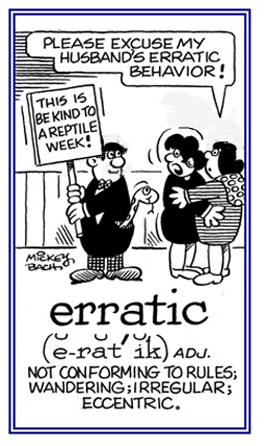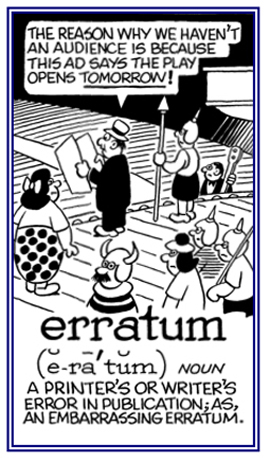err-, errat-
(Latin: wander, stray, rove; deviate)
Errare humanum est. (Latin proverb)
Translation: "To err is human."
Another version is Errare est humanum. It was Alexander Pope, who wrote in his An Essay on Criticism that "To err is human, to forgive, divine."
erratic (adjective), more erratic, most erractic
1. Relating to irregular, uncertain or unorganized movements or behavior: Tracking the flight of the butterfly indicated its flight was most erratic.
2. A reference to an unpredictable, irregular, or inconsistent situation; especially, in being likely to depart from expected standards at any time: During the summer holidays, Jaden's schedule for practicing the piano was more erratic than during the normal school year.
3. Characteristic of something which changes direction and does not follow any definite course: Flying in the wind, Fay's kite was most erratic in its positions.
4. A reference to a constant reorientation which has no fixed or regular path; wandering: Ralph and Deborah decided to take a more erratic route home after the sun came out after the stormy weather.
5. Relating to the lack of consistency, regularity, or uniformity: Dr. Black, the cardiologist, was monitoring Jane's erratic heart beat.
6. Referring to variable or unpredictable conditions; such as, the progression of an illness or the site of pain: Oscar tried to describe the erratic itch he had on his right foot.
7. A description of a rock or boulder that was carried from its source by ice and deposited when the ice melted: Maribel picked up an erratic stone at the foot of the glacier to add to her collection.

© ALL rights are reserved.
Go to this Word A Day Revisited Index
2. A reference to an unpredictable, irregular, or inconsistent situation; especially, in being likely to depart from expected standards at any time: During the summer holidays, Jaden's schedule for practicing the piano was more erratic than during the normal school year.
3. Characteristic of something which changes direction and does not follow any definite course: Flying in the wind, Fay's kite was most erratic in its positions.
4. A reference to a constant reorientation which has no fixed or regular path; wandering: Ralph and Deborah decided to take a more erratic route home after the sun came out after the stormy weather.
5. Relating to the lack of consistency, regularity, or uniformity: Dr. Black, the cardiologist, was monitoring Jane's erratic heart beat.
6. Referring to variable or unpredictable conditions; such as, the progression of an illness or the site of pain: Oscar tried to describe the erratic itch he had on his right foot.
7. A description of a rock or boulder that was carried from its source by ice and deposited when the ice melted: Maribel picked up an erratic stone at the foot of the glacier to add to her collection.

Go to this Word A Day Revisited Index
so you can see more of Mickey Bach's cartoons.
erratically (adverb), more erratically, most erratically
In a manner that is unsteady, random, or that makes unexpected changes and so it is unpredictable: Jillian has been ill and, as a result, she was driving erratically; however, she was able to park her car before she had an accident.
1. An error in a publication discovered after it has been printed; the correction of which is made available on a separate page: The publisher called attention to the erratum in the book by including the correction on a blue sheet of paper.
2. A list of corrections of errors in a printed document: Jarvis noticed that on several pages there were errata as indicated by the book publisher.

© ALL rights are reserved.
Go to this Word A Day Revisited Index
2. A list of corrections of errors in a printed document: Jarvis noticed that on several pages there were errata as indicated by the book publisher.
Some publications point out errata that exist as a list of modifications which are often bound into a book after it has been printed.
There were errata listed for pages 16 and 20 in a recently published history book.

Go to this Word A Day Revisited Index
so you can see more of Mickey Bach's cartoons.
erroneous (adjective), more erroneous, most erroneous
1. Containing or derived from a mistake: Based on the information at the time of publication, the scientist reached an erroneous conclusion.
2. Descriptive of being wrong, based on an incorrect assumption, or containing something that is not right: Steve was told that his facts were correct, but his erroneous conclusions were not acceptable.
3. A reference to straying from what is moral, decent, proper, etc.: Harriet's son committed an erroneous action by staying up beyond his bedtime and watching TV even though he was going to school in the morning.
2. Descriptive of being wrong, based on an incorrect assumption, or containing something that is not right: Steve was told that his facts were correct, but his erroneous conclusions were not acceptable.
3. A reference to straying from what is moral, decent, proper, etc.: Harriet's son committed an erroneous action by staying up beyond his bedtime and watching TV even though he was going to school in the morning.
erroneously (adverb), more erroneously, most erroneously
1. In an incorrect manner: Claus erroneously called Mrs. Smith by her former name.
2. Having made a mistake: The weatherman on the radio erroneously reported that the weather was going to be clear and warm; when actually, it was chilly and raining.
2. Having made a mistake: The weatherman on the radio erroneously reported that the weather was going to be clear and warm; when actually, it was chilly and raining.
That which is incorrect, wrong, or straying from what is decent, proper, etc.: The erroneousness of the information presented by the journalist in his article was criticized by many readers.
1. An act, assertion, or belief that unintentionally deviates from what is correct, right, or true: It was an error on Mark's part to hold the map upside down causing him and his family to get lost.
2. The condition of having incorrect or false knowledge: Because of an error in the referral information, the police ended up arresting the wrong person.
3. The act or an instance of deviating from an accepted code of behavior: Not wearing a tie for his friend's formal wedding was an error on the part of James, the best man.
4. A reference to something that is unintentionally done the wrong way; for example, as a result of poor judgment or not being careful: Kate's silly cat exhibited several errors by jumping on the bed and later jumping on top of the table.
5. A belief or opinion that is contrary to facts or to established doctrines: The error Mrs. White made was in not checking with the principal before scheduling a trip with the students.
6. The state of holding incorrect beliefs or opinions, or the fact of acting wrongly or misguidedly caused by human misconceptions: It was Cleo's error that she spilled the juice because she didn't realize that the lid on the container was loose.
7. The state or fact of being a mistake, or of being inappropriate or unacceptable: The error on the page was glaringly obvious when Roy's friend pointed it out to him.
8. In baseball, a fielding misplay, called when the official scorer judges that a play should have either led to an out or prevented a runner from advancing: The shortstop was charged with an error by the umpire.
9. The failure of a computer program, subroutine, or system to produce an anticipated result: The flashing light on the keyboard of the computer indicated a program error.
10. A variation between the true value of a mathematical quantity and a calculated or measured value: The clerk at the store committed an error when she was calculating the amount of taxes for the purchases.
11. Etymology: from Old French errur, from Latin errorem, "a wandering, a straying, a mistake"; from errare, "to wander".
2. The condition of having incorrect or false knowledge: Because of an error in the referral information, the police ended up arresting the wrong person.
3. The act or an instance of deviating from an accepted code of behavior: Not wearing a tie for his friend's formal wedding was an error on the part of James, the best man.
4. A reference to something that is unintentionally done the wrong way; for example, as a result of poor judgment or not being careful: Kate's silly cat exhibited several errors by jumping on the bed and later jumping on top of the table.
5. A belief or opinion that is contrary to facts or to established doctrines: The error Mrs. White made was in not checking with the principal before scheduling a trip with the students.
6. The state of holding incorrect beliefs or opinions, or the fact of acting wrongly or misguidedly caused by human misconceptions: It was Cleo's error that she spilled the juice because she didn't realize that the lid on the container was loose.
7. The state or fact of being a mistake, or of being inappropriate or unacceptable: The error on the page was glaringly obvious when Roy's friend pointed it out to him.
8. In baseball, a fielding misplay, called when the official scorer judges that a play should have either led to an out or prevented a runner from advancing: The shortstop was charged with an error by the umpire.
9. The failure of a computer program, subroutine, or system to produce an anticipated result: The flashing light on the keyboard of the computer indicated a program error.
10. A variation between the true value of a mathematical quantity and a calculated or measured value: The clerk at the store committed an error when she was calculating the amount of taxes for the purchases.
11. Etymology: from Old French errur, from Latin errorem, "a wandering, a straying, a mistake"; from errare, "to wander".
errorless (adjective (not comparable)
Characteristic of being free from mistakes; a reference to being accurate and correct: Mr. Jones returned Shanna's quiz with a notation of "An errorless score of 100%" which was wonderful news for her.
inerrable (adjective), more inerrable, most inerrable
A reference to being incapable of making a mistake or being consistently accurate: Bruce was confident that the inerrable spelling check mechanism on his computer was accurate, at least for the contents he was preparing at the time.
inerrant (adjective) (not comparable)
Infallible and containing no mistakes: Sharon's inerrant article about the city's financial situation was well received by her newspaper editor.
Indefiniteness or a mistake in a measurement process that varies unsystematically or unpredictably from measurement to measurement: The random error has a magnitude that may be quantifiable by statistical methods.
Random errors are caused by unexpected fluctuations in the readings of a measuring apparatus or by the reader of the instrument.
unerring (adjective) (not comparable)
1. Being very accurate or correct: The interpreter has unerring skills with four different languages.
2. Referring to a situation where there are no mistakes; consistently accurate: The baseball pitcher has had unerring results during the last four games.
2. Referring to a situation where there are no mistakes; consistently accurate: The baseball pitcher has had unerring results during the last four games.
The twelve-year old boy surprised his audience by being an unerring performer during the piano recital.
unerringly (adverb) (not comparable)
With no mistakes or done perfectly: The unerringly qualified writer was always considered to be a reliable source of information.
Showing page 2 out of 2 pages of 29 main-word entries or main-word-entry groups.

